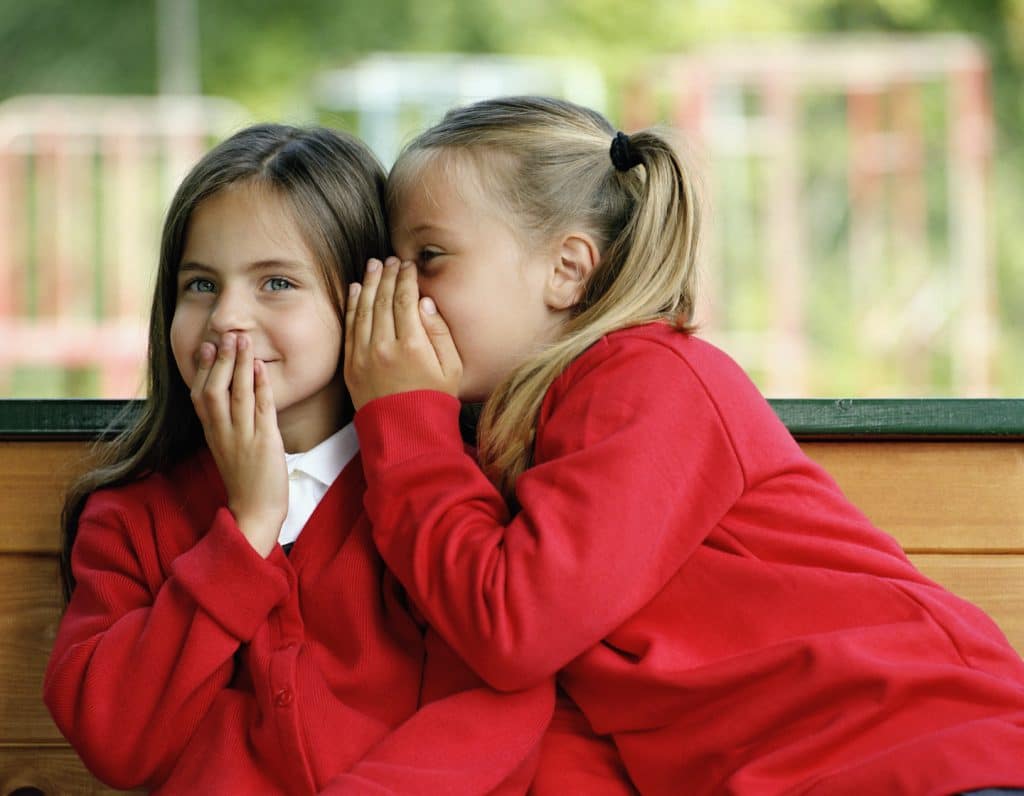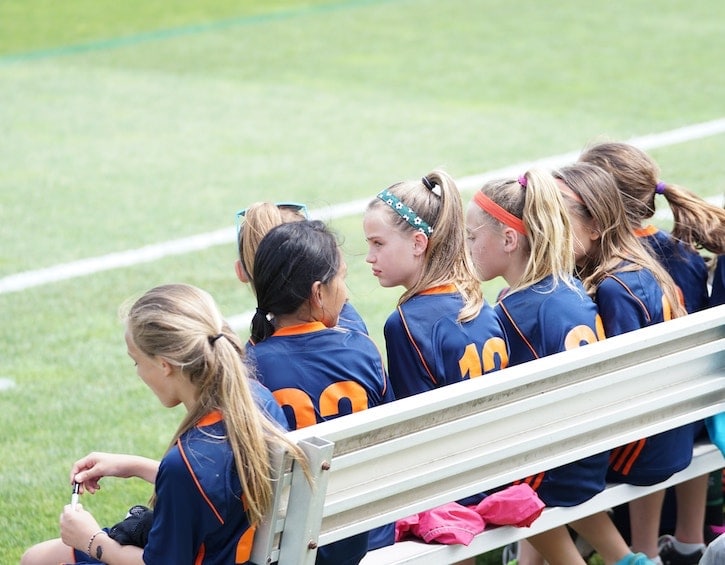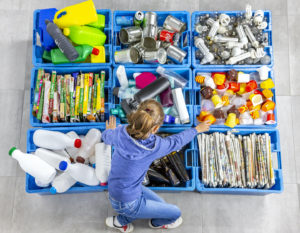




How do we guide our little girls away from ‘mean girl’ behaviour like excluding friends, telling secrets and other forms of subtle bullying?
In this 2-part series on “Mean Girls” psychologist Pip Johnson focuses on the roots of exclusionary and bullying behaviour in girls (from ages 4 to 12), as well as the steps parents can take to help their daughters solve their own problems. In part 2 she will cover the signs to look for, and provide tips for parents who are afraid their own daughter is a mean girl. Click here to read Part 2, which covers how to spot mean girl behaviour and ensure your own daughter isn’t acting like a mean girl!
P.S. Plenty of this applies to boys as well!
My daughter is turning 5 next week, so I am buckling up my seatbelt and feeling some anxiety about getting on the young-girls-social-lives rollercoaster. A common theme in my discussions with mums is that young girls can be vicious – though typically not outwardly so. That’s the thing about girls…often the hurtful behaviour they inflict on others is indirect. This is subtle bullying (also known as “relational bullying”) of people they know well, via things such as social exclusion, spreading rumours, silent treatment, and back-stabbing.
While there are not that many girls who are outright “bullies” or “mean girls”, there are many more girls that can be mean at times. This includes girls who are generally considered to be lovely and sweet, who behave in a way that isn’t very lovely or sweet at all from time to time.
This is all pretty normal. It’s part of growing up. Our girls are learning how to behave in social settings, and often over-correct between too-passive and too-aggressive. This is helpful to remember, as keeping your cool is one of our most important responsibilities when it comes to helping our little girls through these periods.
This is one of the most important developmental journeys of their lives. Our role is to help our daughters blossom into impressive young women, who are both assertive and kind.

What’s going on?
As our girls grow up, the need to belong and fit into a social group becomes THE driving force for their behaviour. This need to belong creates unequal relationships with power imbalances. Peer pressure has powerful effects (even on adults!) and may cause our little girls to do things that aren’t true to themselves. Perhaps they go along with an activity they don’t enjoy, or participate in gossip about someone they like (because they enjoy feeling like they are a part of the group). Or maybe they exclude a good friend under the direction of the group leader.
These situations are difficult for our girls to manage. There is conflict between their social needs (what is required to be part of the group) and their personal needs (being true to their own internal needs and doing what they know is right). Once they are in one of these relationships, girls often swing from passive to aggressive behaviour (from “nice girls” trying to fit in to “mean girls” over-shooting as they try trying to get their needs met).
Let’s look at an example. Kim and Jane are 6-year old girls and have been best friends since they were toddlers. Kim is the leader and makes most of the decisions about what games they play or what roles they each take (e.g. Kim is always the mum or teacher!). Jane mostly goes along with things but is (privately) frustrated that she doesn’t get to direct play. One lunch, Jane breaks away from Kim and initiates play with another little girl (“Lucy”). When Kim tries to join in, Jane tells Kim that she doesn’t want to be her friend anymore because “Lucy is a nicer friend”.
Who is the “mean girl” in this scenario? Is it Kim for being bossy and dictating how Jane should always play? Or Jane for excluding Kim?
The crux of this issue is that Jane allowed Kim to hold all the power. When it all got too much, she struggled to be assertive and communicate what was wrong, so she ended up over-shooting and being hurtful. She swung from being too passive, to too aggressive. This is a very simple example but represents what often goes wrong in girls’ friendships.
The good news is that these times are opportunities to develop forgiveness and assertiveness skills that will benefit them for the rest of their lives. The bad news is that learning these skills is hard and takes a long time.
So, how do we guide our girls through these struggles, and what are some of the common issues to look out for?
Being your daughter’s greatest ally and coach
Often our first instinct is to jump in and fix the issue for our girls. Or if you’re a little less direct, perhaps to tell them what to do to fix it themselves. Neither of these options is right in the long run. Our objective is to make them feel empowered and to develop their social skills so they can better manage these situations on their own in future.
In their book Little Girls Can Be Mean, Michelle Anthony and Reyna Lindert propose a 4-step plan to help overcome social difficulties:
- Observe – start before difficulties arise. Observe your daughter in social situations. Be a fly on the wall at playdates and develop an understanding of how your daughter interacts with her friends. Does she play a passive role, or a leadership role? How does she negotiate for what she wants? What are the dynamics in her different friendship groups? This will help you identify when something is wrong and to guide her to the best course of action.
- Connect – don’t skip this step! It is so easy to go straight from observing (“Eek, I see a problem!”) to guiding and directing (“Right, this is what you should do!”). Connecting is about you becoming your daughter’s greatest ally and her feeling like you are facing this issue as a team. To achieve this, you need to understand your daughter’s perspective and to show her you care. Ask lots of questions, do lots of active listening, and really empathise with the issues your daughter is facing (perhaps tell stories about when you were a little girl). It is very important to stay calm during this step – by doing so, you signal to your daughter that it is going to be ok!
- Guide – the critical thing here is to guide, not to direct! It is easy to jump into solution mode, but it is much better if our daughter owns her solutions. Guiding is about asking questions that help your daughter to find her solution to the problem. For example, instead of lecturing her on how she should not exclude someone just because the leader of the group says to do so, you might ask: “How does it make you feel when Suzy (excluded girl) comes over and you have to turn away?”; or perhaps “What kinds of things are you thinking when Lisa (group leader) tells you how you have to act toward a friend?”. Guiding is about helping your daughter come to the right answer herself – this takes more time in the short run, but pays off in the long run.
- Support to Act – again, this is about empowering your daughter to act for herself. There will be times where an urgent situation needs your action, but in most cases your daughter needs to be the vehicle for change. Supporting your daughter to act may be helping her find what to say in a particular social situation and role playing this with her, helping her broaden her social circle by organising playdates with different girls, or encouraging her to take steps to mend a broken friendship. Sometimes, supporting to act may also involve liaising with her teacher (see tips for yo-yo friendships in part 2!).
This four-step model is something you can use in good and bad times. Observing, connecting and guiding will bring you closer to your daughter and make it easier for you to support her when the big issues pop up. The more she feels you two are a team, the greater the chance she will come to you when something difficult occurs.
In the end, this is all a part of growing up. The emotional nature of the way girls relate to each other makes their relationships complex, and the tensions between their need to belong to a group and their own personal needs makes things tricky at times. Ultimately, this is an opportunity for us to teach assertiveness and forgiveness. Our aim is to create impressive young women who are gentle enough to forgive, and strong enough to stand up for themselves in a calm way. This is hard to do, even as an adult.
The four steps above will help you connect with your girls and support her as she makes the transition. In the next article, I will provide some tips on dealing with common problems such as Yo-Yo friendships, group difficulties, and what to do if your daughter is a mean girl.
Read more: What to do if you suspect your own daughter is a mean girl






 View All
View All





 View All
View All







 View All
View All







